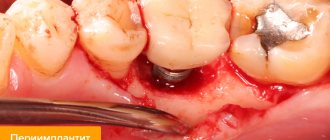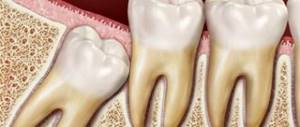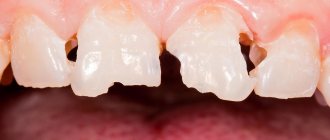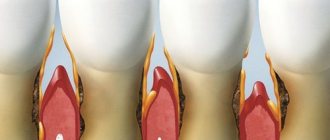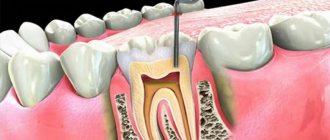Everyone knows what caries is and, of course, more than once had to go to the dentist. But often patients are confident that dental treatment is not required until they become painful and do not cause discomfort. Now, if the caries has spread and become clearly visible, and the tooth hurts, now is the time to go to the doctor, but there’s no point in fussing ahead of time, and you shouldn’t waste money either. But such a position cannot but be considered erroneous and dangerous, because caries is not just a problem, but is a disease that requires immediate treatment, otherwise you may face very serious consequences.
Why is treatment of caries, if the tooth does not hurt, still necessary?
When teeth are affected by caries, they can make themselves felt at the most inopportune moment. Imagine the situation: you are on vacation, and you are going to visit another country or are already there, or went to another city or wanted to relax in nature, and the nearest dental clinic is several hours away from you, and your tooth hurts a lot, your cheek is swollen, and No drugs relieve the symptom. What should I do? Of course, it would be better to treat teeth at the initial stage of caries development, before they begin to become inflamed, before acute pain or even a cyst appears. The current situation requires an urgent search for a dentist. Naturally, if you are staying in a foreign country or city, the cost of services will be much higher, and one can only guess how high-quality and durable the result you will get.
One of the important reasons why it is very necessary to treat caries when teeth do not hurt is the possible consequences of untimely treatment.
Why do you still need to treat baby teeth?
Very often, parents are mistaken, saying that baby teeth are temporary and do not need to be treated; they will fall out anyway. They are temporary, temporary, but since nature has rewarded us with them, it means we need them for something! It takes 12-13 years from the moment baby teeth erupt until they are replaced by permanent ones. This is a fairly long period of time during which the jaws must grow to their full size, a bite is formed on the temporary teeth, and the permanent teeth mature. All this is ensured by the presence of milk teeth.
It is also necessary to remember that:
- Having lost a baby tooth, it is more difficult for a child to chew food, as a result of which the gastrointestinal tract (gastrointestinal tract) may suffer;
- Teeth are needed not only for chewing food, they are also involved in speech formation. It will be more difficult for the child to talk, and as a result, social adaptation will suffer;
- When a baby tooth is removed, a neighboring tooth may move into its place, since “nature abhors a vacuum,” as a result of which permanent teeth may erupt in their place.
- An affected tooth can also cause disease in the permanent tooth underneath it.
Therefore, milk teeth are not only necessary, they simply must be treated!
Naturally, treating baby teeth is not an easy task. It is often complicated by the fact that children are very afraid of dentists, but with coordinated work between parents and the doctor, you can calm the little patient and achieve the desired result. And we, doctors, only need one thing, for our patients to be healthy and happy!
What happens in the oral cavity when a diseased tooth is not treated:
- Caries spreads to healthy teeth and you can lose your entire dentition
- This is accompanied by inflammatory processes in the body
- The stomach and cardiovascular system suffers
- A cyst forms, which can lead to blood poisoning or cancer
Along with serious problems for patients, bad breath is inevitable, psychological problems arise (a person feels insecure, he is tense, he is susceptible to stress), which are caused by the unaesthetic appearance of the dentition. This is why it is necessary to treat teeth, even if they do not hurt or cause discomfort.
If it is not possible to prevent or avoid caries, it is necessary to treat it when the first signs appear, without delaying a visit to a specialist. In addition, thanks to modern dentistry, painless dental treatment is available. How? In modern dentistry, drug sedation is used. All procedures are supervised by an anesthesiologist, and you will not experience any pain, fear or discomfort.
Reiter
Healthy teeth are the key to success. Every person knows that it is important to keep teeth healthy, because any dental diseases are fraught with serious consequences. This is especially true for advanced forms, when the tooth is already destroyed or needs to be removed. But not everyone understands why they treat teeth , why it is so important and why do it. It would seem that everything is very simple, any disease must be treated, but with teeth everything is more complicated, because there is a certain fear of pain and the procedures themselves. In order to understand how important all such healthy teeth are for a person and why they need to be treated on time, you need to know a few facts about this.
Healthy teeth are the key to the health of the whole body
The digestive process always begins in the oral cavity, every person knows this. When even primary signs of caries, gum disease and other troubles appear in the mouth, active proliferation of bacteria begins. Through the digestive tract, these bacteria enter the body, where they continue to develop. This poses a threat to the functioning of all organs and the body as a whole. This is why teeth are treated
, and it is advisable to do this as soon as possible. The development of these bacteria in the human body, in the digestive tract, can lead to diseases such as ulcers, gastritis and many other troubles. Therefore, it is believed that healthy teeth are always not only a beautiful smile, but also a guarantee of the health of the body as a whole.
The situation is even more serious with tooth loss. With the loss of one, or even more so several teeth, the process of asymmetric development of the jaw joint begins. This can lead to other diseases, headaches, visual and hearing problems. That's why teeth are treated on time. Therefore, you must try to preserve your teeth at any cost.
Healthy teeth are the key to a good figure
It would seem that what could be the connection between the oral cavity and the figure. But in fact, these factors are very closely related. When teeth are lost, the process of chewing food becomes incomplete. Food enters the body in large pieces. This entails a burden on the digestive organs and processes. Metabolism is disrupted, so weight begins to increase. This explains why it is always necessary to treat teeth on time. Therefore, if you want to maintain a slim, athletic and beautiful figure, then you must, first of all, monitor the health of your teeth.
Fresh breath
Every person has encountered in communication a situation where the interlocutor had an unpleasant odor. An unpleasant odor occurs as a result of the active reproduction of the same pathological bacteria. Therefore, in order to always have fresh breath, it is necessary to monitor the oral cavity, regularly brush your teeth and, of course, visit the dental clinic.
Healthy teeth – safety of others
Scientists have proven that caries is a disease that is accompanied by the active proliferation of harmful bacteria. In fact, this is an infectious danger to others. Through contact, for example, if you drink from the same cup, or through kissing, these bacteria are transmitted to others. Therefore, answering the question why teeth are treated , the answer will be simple, it is also the safety of the people around us and, above all, loved ones, family members, children. It is worth thinking about the fact that when a person, for example, licks a spoon while tasting food before giving it to a child, it becomes infected with these bacteria. They are then passed on to the child.
A beautiful smile is the key to success
Every person knows the hackneyed truth that everything starts with a smile, and people are greeted not only by their appearance, but also by a person’s smile. American scientists conducted a large-scale study and proved that the more beautiful a person’s smile, the easier it is for him to achieve certain results in society. Therefore, healthy teeth contribute to positive dynamics at work and in communication with other people. This is why successful people, movie stars, treat their teeth; they know that a smile is not only health, but also a weapon in achieving their goals.
Many people underestimate the issue of dental health. And they cannot give an exact answer to the question of why teeth are treated. But as can be seen from the factors stated above, the health of teeth and the oral cavity in general directly affects the entire body. Therefore, every person should know why teeth are treated and why it is necessary to undergo a routine examination by a dentist. It must be remembered that the sooner a person goes to the clinic for help, the more successful the treatment will be.
Treatment at the initial stage is faster and cheaper
When treating caries at the initial stage of its development, anesthesia is not required, since the procedure itself is painless, and the filling will cost less due to the use of a small amount of material. In addition, you will spend much less time: the doctor will fill a small hole in a tooth in 15-30 minutes, while he will have to treat the entire tooth and install a large filling for at least an hour. It all depends on the condition of the dentition and the degree of complexity of the operations performed.
Now you have learned why it is necessary to treat caries, even when your teeth do not hurt. It is possible to prevent serious oral diseases and maintain healthy teeth for many years if you treat your teeth in a timely manner. And one should not neglect the rules of hygiene and preventive examinations at the dentist. The beauty of your smile largely depends on you!
Dental treatment. Why is it important to do this on time?
Visiting the dentist is one of those things that we most often put off until an indefinite “later.” The motive for this behavior is clear: few people can boast of a sincere love for visiting the dentist. Many people still remember the good old days, when they treated and removed teeth with weak anesthesia, or even without it, under the ominous rattling of an old drill in a dental office, where you still had to stand in a kilometer-long line. In addition, it can always turn out that everything is even worse than it seems, and a slight pain in the tooth is a symptom of some kind of pulpitis... In general, there is something to be imbued with a passionate desire to “not notice” the line in the diary that reads: “19-00 : Dentist".
When it comes to a routine examination, the reluctance to meet with a dentist is even greater: when nothing hurts, then there is no incentive to visit.
We often console ourselves with all sorts of considerations, among which the most popular are the following: “I have more important expenses to spend now,” “If caries already exists, it won’t go away: I’ll fly later,” “Maybe the pain will go away on its own, I’ll apply some salt.” . All this allows us to lull the voice of reason, which calls us to stop inventing nonsense and make an appointment, and, as practice shows, all such “lullabies” lead to the same result: we only make things worse for ourselves. The fact is that ALL problems with teeth and gums have the property of a linear course of the disease. This means that if you already have caries or inflamed gums, the disease will not disappear on its own
, will not go away, will not be cured on its own.
There are diseases that, even if we neglect them, can (but not necessarily) go away on their own: for example, a cold. But diseases of the teeth and gums are not one of these; on the contrary, caries will only deepen every day and “devour” your tooth deeper and deeper, risking turning into pulpitis or periodontitis, gum inflammation will become chronic, lead to the development of a serious disease and end with the loss of healthy teeth. There are no exceptions to this pattern! This means that if you do not solve the problem here and now, it will only get worse and may turn into a complication. When you finally get to the dentist, it may turn out that now you have not just a problem, but a Big Problem
, and you no longer just need to drill a little and put a neat filling, but, as they say, drill-cut-gouge, remove or make a prosthetic .
And financially, the amount will be completely different: for example, the cost of treating average caries is approximately 3 times lower than the cost of treating a common complication - pulpitis. As a result, you lose on all counts
: you significantly worsen the condition of your teeth, or even lose them, experience much greater inconvenience and pain, and spend amounts several times higher than what you would have paid initially.
In order not to be unfounded, let's consider the direct dependence of the type of treatment on the degree of neglect
of the most common dental disease -
caries
: •
Demineralization of enamel
(white spot stage, usually detected during a routine annual examination by the dentist).
Treatment: remineralizing therapy, consisting of repeated coating of the damaged area with fluoride-containing preparations. Forecasts: the most optimistic. With proper treatment and follow-up, it is possible to stop the progression of dental caries. • Enamel caries
.
Treatment: in some cases, the gentle method discussed above may help. Otherwise, a superficial preparation is carried out and a small filling is installed. The treatment is relatively quick and relatively painless, allowing for maximum tooth preservation. • Dentin caries
.
The most advanced version of caries without complications. Treatment: preparation and installation of fillings or microprosthetics in the form of ceramic inlays replacing fillings. Complications of caries
So, if you do not get to the dentist on time, caries inexorably moves into the next stage, which is expressed in all sorts of complications: •
Pulpitis
.
Treatment: is a set of measures. First of all, endodontic treatment (mechanical and medicinal treatment of root canals, as well as canal filling), then therapeutic (filling) or orthopedic (crown) tooth restoration. • Periodontitis
.
The treatment is similar to the treatment of pulpitis, but has its own characteristics. In some difficult cases, there is a need for surgical treatment (cystectomy with resection of the apex of the tooth, amputation of the tooth root, hemisection, etc.). Periodontitis is often complicated by periostitis
, an inflammation of the periosteum.
In this case, treatment is usually complex - endodontic (opening the root canals to drain pus), surgical (tooth extraction, an incision in the mucous membrane to drain pus in the area of the apex of the tooth root) and medication. However, it is not always possible to save a tooth. A small disclaimer: the specific type of treatment in each individual case is chosen by the dentist
and takes into account all the features of the development of the disease.
The stages of development of caries and complications that we have listed and the corresponding treatment methods are given so that you understand the direct dependence of the complication of the problem on its neglect. The more advanced the caries, the more serious methods are used - even those that can only be dreamed of in a nightmare by a person with dental problems. And this applies not only to caries, but also to other dental diseases. For example, many perceive the presence of tartar
as a purely aesthetic problem.
But in fact, tartar is the main cause of gum disease, and also contributes to the development of caries and related diseases. If you remove it regularly, there will be no problem at all. If you neglect it, you will get sore gums and other complications. Calendar of dental treatment and prevention
You should undergo a routine examination by a dentist once every six months: this is exactly the period during which not a single disease of the teeth and gums will go into an advanced state. But if you feel pain or see suspicious spots on your tooth, the onset of caries, if your gums are bleeding or inflamed, contact your dentist immediately!
Beautiful smile. How to achieve this?
diseases of the teeth and oral cavity dentist dentistry health control prevention tooth gums

